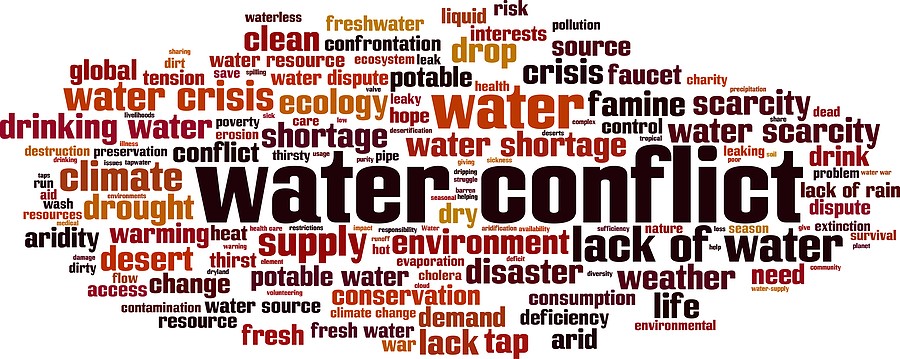News
Water Crisis Exacerbating Global Conflicts, UN Report Reveals
Safe water and sanitation is an undeniable human right, but official Unesco figures still continue to show that there are some 2.2 billion people around the world who live without access to drinking water and a further 3.5 billion who don’t have access to sanitation.
In order for global societies and civilisations to flourish and thrive, access to safe water is an absolute must, but resources are being put increasingly at risk because of pressures from pollution, water mismanagement, urbanisation, population growth and – of course – climate change.
This latter concern is viewed as a threat multiplier, making water deficits, extreme weather events and natural disasters more and more likely as time goes on… and this can add fuel to the fire of existing tensions between neighbouring countries, increasing the risk of water-related conflicts – particularly in those places that are already feeling the pinch of water stress and scarcity throughout the year.
A new report from Unesco, in collaboration with UN Water, has found that tensions relating to water are now making these global conflicts worse and the fear now is that inequalities over water may continue to rise in the future.
Drought conditions affected over 1.4 billion people between 2002 and 2021, and approximately 50 per cent of the world’s population experiences severe water scarcity for at least some parts of the year as of 2022. Of those facing extremely high levels of water stress, more than a quarter use over 80 per cent of the annual renewable freshwater supply.
This in itself is dire enough, but when you take into the account the fact that climate change is now expected to increase the frequency and severity of such drought events, it’s clear to see that the risks to social stability are becoming increasingly acute.
One of the main concerns surrounding water security is that it’s a big driver of migration. Displacement of populations can make water insecurity worse by putting additional strain on local water systems and other natural resources in settlement locations, which in turn can exacerbate social tensions, the report goes on to note.
One study, for example, found that a 200 per cent increase in gender-based violence was seen in Somalia against a group of displaced people.
Conflicts rising
Part of the problem is that while around 40 per cent of global populations share river and lake basins, only one-fifth of the countries with transboundary waterways currently have cross-border agreements in place to manage the shared resources fairly.
Many of these basins have already seen interstate tensions, some of which date back many years, with far-reaching implications for water supplies and infrastructure, as well as future cooperation on water issues.
One of the most vulnerable countries to interstate water tension is Africa, with 19 out of 22 states experiencing water scarcity and two-thirds of freshwater resources transboundary.
Lake Chad, for example, has decreased in size by 90 per cent over the last 60 years, increasing the region’s economic and security challenges.
But all is not yet lost, with the Lake Chad Basin Commission expanding its mandate to ensure that the waters are used most efficiently, with local development coordinated properly and disputes prevented that could potentially arise between local communities in Cameroon, Chad, Libya, Niger, Nigeria and the Central Africa Republic.
This just goes to show that even in some of the most complicated scenarios, there are ways and means to implement policies on water access and shared resource management, policies that are fair and equitable, thanks to United Nations support and international cooperation.
Audrey Azouley, director-general of Unesco, commented on the findings, saying: “As water stress increases, so do the risks of local or regional conflict. Unesco’s message is clear: if we want to preserve peace, we must act swiftly not only to safeguard water resources but also to enhance regional and global cooperation in this area.”
Water for peace
As explained by the Stockholm International Water Institute, water can be used as a tool for peace, rather than the driving force behind conflicts between nations.
Tension can be deescalated, for example, when countries collaborate over transboundary water resolutions. Water diplomacy can also help set up or improve upon technical and political cooperation over shared basins, bringing more actors into the mix, enhancing knowledge and encouraging dialogue on these matters.
It will also be necessary for environment, climate, security and development experts to come together to share knowledge so that the threats associated with the likes of climate change, population growth and environmental breakdown are better understood.
Devising water policies that have been informed by conflict assessment and climate means that natural resources can be more sustainably managed, allowing institutions to prevent conflicts, build peace capacities and ensure that water systems become more resilient, safeguarding resources for future generations.
How businesses can help
It may not seem as though there’s much that businesses can do to prevent water conflicts from arising, but reducing your overall water footprint and becoming more effective water stewards means that you’ll relieve pressure on dwindling water supplies, keeping it in the ground so it can be used elsewhere.
You might be surprised at just how much water your business actually uses – and the first step towards making reductions is having a water audit carried out across your site, taking into account your entire supply chain.
Once you can see where and how you’re using water, you can bring in water-saving measures, the added benefit of which is that you’ll save your business money at the same time. If you’d like to find out more, get in touch with the H2o Building Services team today.
